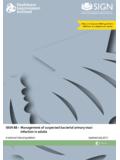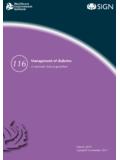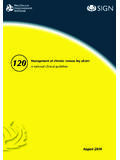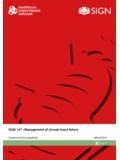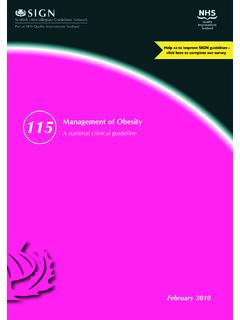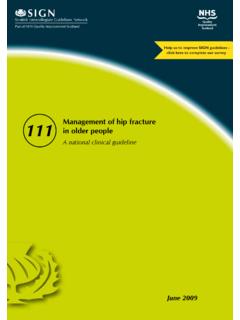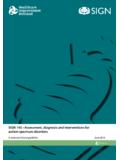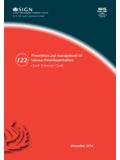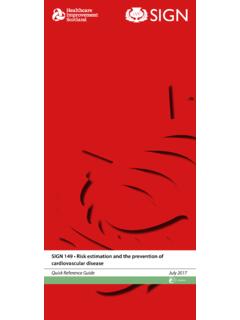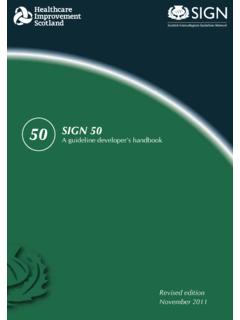Transcription of SIGN Long COVID patient booklet
1 A booklet for people who have signs and symptoms that continue or develop after acute COVID -19 long COVIDC ontents Scottish Intercollegiate Guidelines Network 978-1-909103-84-9 First published December 2020 This document is licensed under the Creative Commons Attribution-Noncommercial-NoDerivatives International Licence. This allows for the copy and redistribution of this document as long as sign is fully acknowledged and given credit. The material must not be remixed, transformed or built upon in any way. To view a copy of this licence, visit is this booklet for?12 How will my care be planned?3 What is long COVID ?18 How will I be followed up?8 How will my symptoms be assessed?20 Where can I find out more? 2 What is this booklet about?13 What can help?4 How can I tell if I have long COVID ?19 Who will be involved in my care?10 What tests will I have? long COVID1 This booklet is for people who have had COVID -19 (with or without a positive COVID -19 test) and have symptoms that last more than four weeks, including: adults young people children.
2 It may also be helpful for: parents of children who have had COVID -19 other family members, partners, friends and is this booklet for? long COVID2 management of people who have new or ongoing symptoms after having COVID -19, including: - assessment - common symptoms - self-managment, and - rehabillitation. management of acute COVID -19 (symptoms for up to four weeks) management of other conditions with similar features to long COVID , for example post-intensive-care syndrome and chronic fatigue syndromeThis booklet explains the recommendations in a guideline produced by the Scottish Intercollegiate Guidelines Network ( sign ), the National Institute for Health and Care Excellence (NICE) and the Royal College of General Practitioners (RCGP) on managing the long -term effects of is this booklet about? If you would like to see the guideline, please visit: or booklet will cover: The booklet will not cover:Recommendations from the guideline are shown in this booklet by this COVID3 What is long COVID ?
3 Healthcare professionals also talk about the signs and symptoms of COVID -19 that last up to four weeks. This is called acute COVID -19 .After catching COVID -19 people usually start to feel better in a few weeks. Unfortunately, some people take a lot longer to get better. long COVID can affect your whole body. Ongoing or new symptoms of COVID -19 can change and come and go over a period of time. To describe these symptoms, healthcare professionals may use different terms. long COVID is one of them. In this booklet we use long COVID to mean signs and symptoms that last more than four weeks after you get COVID -19. When talking about long COVID , definitions that healthcare professionals use, are:Information about signs and symptoms that develop during or following COVID -19 can be found on the Your COVID Recovery website here Signs and symptoms in children and young people are different from those in adults.
4 Information can be found here symptomatic COVID -19: signs and symptoms of COVID -19 from four weeks up to 12 syndrome: signs and symptoms that develop during or after an infection consistent with COVID -19, continue for more than 12 weeks and are not explained by an alternative diagnosis. long COVID4 How can I tell if I have long COVID ?If you have had COVID -19, the healthcare professional you speak with will talk to you about what to do if your symptoms are not getting any better. Unfortunately, there is no way to predict how long recovery will healthcare professional will do the following: Offer you a consultation appointment. Give you information in a format or language that you can understand to help you take part in decisions about your you develop long COVID is not thought to be linked to how severe your COVID -19 was (including whether you were in hospital). The healthcare professional you speak to will give you advice and written information on: what to expect during your recovery symptoms to look out for that would mean you need to be seen again by a healthcare professional who to contact if you are worried about: - any new, continuing or worsening symptoms - symptoms that go on for longer than four weeks after the start of your infection, and how to self-manage your you are concerned that you still have symptoms or have new symptoms four weeks after the start of COVID -19, you should speak to your healthcare you do not receive information in a format or language that you can understand, you can ask for it.
5 You will be given a choice to have appointments during your recovery by telephone, video or (where this is possible) in person. long COVID5 Respiratory symptoms Breathlessness CoughCardiovascular symptoms (heart and circulation) Chest tightness Chest pain PalpitationsGeneral symptoms Fatigue Fever PainNeurological symptoms Cognitive impairment ( brain fog , loss of concentration, or memory issues) Headache Sleep disturbance Peripheral neuropathy symptoms (pins and needles, and numbness) Dizziness Delirium (in older people)How can I tell if I have long COVID ? continuedCommon symptoms of long COVIDS igns and symptoms after acute COVID -19 can be highly variable and wide ranging. The most commonly reported ones include:Continues on page 6 long COVID6 Common symptoms of long COVID continuedGastrointestinal symptoms (digestive system) Abdominal pain Nausea Diarrhoea Anorexia and reduced appetite (in older people)Musculoskeletal symptoms Joint pain Muscle painPsychological/psychiatric symptoms Symptoms of depression Symptoms of anxietyEar, nose and throat symptoms Tinnitus (ringing in the ears) Earache Sore throat Dizziness Loss of taste and/or smellDermatological symptoms Skin rashesHow can I tell if I have long COVID ?
6 ContinuedSigns and symptoms after acute COVID -19 can be highly variable and wide ranging. The most commonly reported ones include: long COVID7 How can I tell if I have long COVID ? continuedRecommendationYour healthcare professional will explore whether you may have long COVID if: you still have symptoms after four weeks, or you have new symptoms four weeks after the start of your first consultation appointment, your healthcare professional will discuss and agree whether you need to have another appointment to assess your condition. They will also agree with you what further assessments will be needed, based on your symptoms. RecommendationIf you need it, you will be supported through your assessment and the care you need, for example by having extra time for your appointment or having an interpreter. Your healthcare professional may ask to include your family or carers in discussions.
7 They will agree this with you..actually just the experience of being heard and feeling like somebody got it and was being kind about I just kind of needed to know that I wasn t losing it really and it was real what I was COVID8 How will my symptoms be assessed?Nobody else understands your symptoms as well as you and you are the best person to help your healthcare professional understand how they affect you. Your symptoms can be assessed in several ways, which will include looking at your physical and mental wellbeing. RecommendationIf your healthcare professional thinks you have long COVID they will do the following. Take a medical history and ask about: - whether you have had or think you have had COVID -19, or have had a positive or negative COVID -19 test - your symptoms since having COVID -19 - when the symptoms started and how long you have had them - any other health conditions you have.
8 They may examine you to find out more about: - any physical symptoms you have - if you ve noticed or are having difficulties with your memory or thinking - how you are managing with day-to-day activities, for example your work or education, getting about, general wellbeing, looking after yourself or feeling isolated - changes in your behaviour, emotions and healthcare professional will talk to you about the wide range of symptoms and how they may come and go over COVID9 How will my symptoms be assessed? continuedRecommendationIf you have a severe mental health condition or your healthcare professional is concerned that you are at risk of self-harm or suicide, you will be referred urgently for assessment by a mental health professional. RecommendationYou will be referred urgently to hospital if you have any signs that could be a life-threatening complication, for example: a low level of oxygen in your blood severe lung disease chest symptoms were like a game of whack-a-mole.
9 Different ones would surge at different times and in different places in my information about what to do if your child seems very unwell please visit COVID10 What tests will I have?Your healthcare professional will carry out some tests to investigate your signs and symptoms. This will also help them rule out other conditions. RecommendationIf you have mental health symptoms such as mild anxiety or mild depression, you may be referred: for psychological therapies, or to a liaison psychiatry service if you have more complex physical and mental health more information about liaison psychiatry services, please visit RecommendationTests may include: blood tests if appropriate, an exercise tolerance test suited to your ability (for example a one-minute sit-to-stand test). measuring your lying and standing blood pressure and heart rate if you haven't already had one, a chest X-ray by 12 weeks if you still have breathing COVID11 What tests will I have?
10 ContinuedRecommendationIf your healthcare professional thinks your symptoms are not related to COVID -19 and may be due to another condition, you will be offered other appropriate tests. You may also be referred to a specialist in that I found really useful is having some COVID12 How will my care be planned?When planning your care, it is important that you are involved in discussions and decisions. RecommendationAfter your assessment your healthcare professional will discuss with you and agree what further assessment, support and rehabilitation you need and how this will be provided. This will include: advice on self- management , with the option of supported self- management (see pages 13 and 14), and depending on your need: support from primary care, community and mental health services referral to a multidisciplinary assessment service (involving various professionals from health and social care) referral to specialist care if you have work out what support you need, your healthcare professional will talk to you about: the overall impact of your symptoms on your life, even if each individual symptom by itself may not feel that bad how your symptoms may change or come and go, and how you might need different levels of support at different COVID13 What can help?
